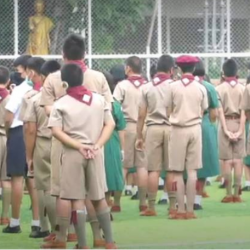What can we learn from Depp-Heard case

The courtroom drama between Johnny Depp and Amber Heard offers food for thought for Thais, should a famous Thai man and his former partner ever go head-to-head before the judges and in the full glare of the media. Thailand may reach that point one day, although for now, it’s a far-fetched scenario. Getting a free and fair trial with lots of experts from various disciplines taking the stand is even more remote.
Depp and Heard had to allow the public to look into parts of their lives that they might not be proud of. As they recalled their life together including unfavorable and painful sentiments, they had to face not just the conventional Court but the Court of Public Opinion. The “juries” were not just in the courtroom but also on social media.
Here are what we can learn from this case before their day comes.
Document any and all abuse wisely and reach out for help immediately
It is important that a victim of domestic abuse documents the incidents in the form of photos, medical records, expert opinions, and where possible, audio or video. Some abusive behaviors are beyond the average person’s expectations, and others are not physical but mental. Victims may need to present this evidence in court to seek justice.
Remember your own accounts will not be enough to win the case and nor will witness accounts, especially of those related to or very close to you. Bear in mind that this is the digital age so everything leaves a footprint and any evidence must be authentic as edited or doctored evidence can be traced.
Go easy on social media
Everyone has the right to express his or her opinion as long as it doesn’t violate another person’s rights. Social media is a double-edged sword: used wisely, it can help victims and vice versa. In a high-profile case like this, the public should not get caught up in sensationalism, and must avoid being too judgmental because we would never know the whole truth of the two-party dispute. Condemning any side could make it more difficult for other victims to come out and speak up in the future.
Violence can be against any gender
Though violence against women is more common in the public eye, a victim of violence can be of either gender. Men can be abused too. In Thailand, most of the husband-beating wives are portrayed in soap operas, sit-com series, and fiction. Sadly, there must be some men who put up with the abuse in real life too though, in Thailand, the society is not as sophisticated as in the West to see the clear patterns of psychological abuse. But even in a more cosmopolitan society like the UK, violence by women against men is also under-reported.
The media in UK explain that it has to do with a culture of masculine expectations. In the UK, it is reported that only about 10% of male victims of female violence actually come forward. Any abused man needs to be brave to risk the fear of being misunderstood and of not being believed. In Thailand, just thinking about being laughed at can discourage a Thai man to report his abuse.
Walk out of a toxic relationship as soon as you see a red flag
When one is in a potentially abusive relationship, there will inevitably be an incident that raises a red flag. And if one sees a sign, the best reaction is to try to get help and walk away from an abusive partner.
Johnny Depp and Amber Heard have shown us a devastating example of domestic violence. This is a serious problem, not entertainment. Let’s learn from it.
Whether you like it or not, society has a template of what an abuser looks and acts like, and especially when the abuser is wealthy and powerful, it is less likely that the abuse would be believed. [In this case, prior to this trial, it was hard to believe that Depp was the abused, particularly as he lost a libel case in which he was accused of being an abuser in Britain in November 2020.]
You may seek help from a counseling party. In Thailand, abuse is common and the victims can report instances to government hotlines (1300, 1387, 191, and 1157). There are NGOs running help programs and emergency homes for victims too.
The reason that you can’t seek help from your local police is that most of them, despite learning from the past, still ignore domestic violence and consider it as a “private matter of the couple”. This “family matter” belief must end. In case you can’t make a phone call, try other means such as Twitter @CSDThailand (Crime Suppression Division). Keep the contacts handy and use them when you need to.
By Veena Thoopikrajae






